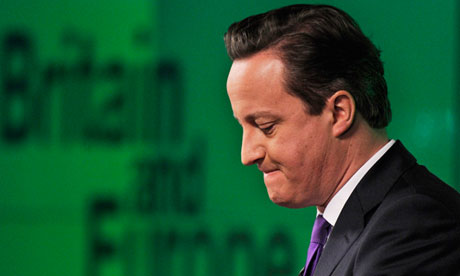EU referendum: Climate efforts could be 'collateral damage', warn MEPs
Ukip launch petition to suspend EU energy and climate targets as MEPs speak out on environment impact of a UK exit

David Cameron delivers his much-delayed speech on Britain's relationship with Europe, pledging an in-out referendum by the end of 2017. Photograph: Facundo Arrizabalaga/EPA
Fears are growing in Brussels that climate policy could become a political football in any referendum on EU membership, following British Prime Minister David Cameron's declaration of intent on Wednesday to hold an in/out poll.
The UK Independent Party (UKIP), which has links to the eurosceptic right of Cameron's Conservatives, launched a petition on 21 January calling for the EU's climate and energy targets to be suspended.
The petition's professed objectives – to prevent carbon leakage, stop 'wasting money' on unilateral climate measures, reduce energy prices and increase energy security by allowing more fossil fuel use – are widely shared on the Conservative right and among Europe's energy-intensive industries.
UKIP's initiative may not reach the million signatures needed to activate EU policy-making processes, but it has set alarms ringing that climate change could enter the UK's Europe debate by the backdoor.
"I don't believe that environmental legislation is high among David Cameron's concerns about the EU, but certainly it could be a victim of collateral damage if the UK were to pull out [of the EU]," said Graham Watson, a Liberal Democrat MEP.
"There is certainly an agenda, which has infected sections of the Conservative party, that argues we should ignore the climate and just continue to make money hand over fist," Watson said. "Those arguing for our withdrawal from the EU tend also to be those who wish to build on the fossil fuel economy rather than making the green energy switch."
Tom Spencer, a veteran ex-Conservative MEP, agreed that climate change policy would be "one of the victims" of the disruption accompanying a UK withdrawal from Europe.
But environmentalists in Brussels could also be among the losers if Britain checks out at the Brussels door.
The UK has historically taken a firmer line on climate policy than some other EU states for reasons ranging from the scientific quality of its Met Office, to the destruction of its coal industry in the 1980s.
Although London has weakened proposed EU legislation on Arctic drillingand tar sands, it has also pushed for stronger carbon dioxide emissions reductions targets and from 1 April, will be implementing a carbon price floor.
The UK has aligned itself with European states calling for robust backloading of up to 1.2 billion carbon allowances to shore up the EU's ailing carbon market.
Isaac Valero, the spokesman for EU Climate Commissioner Connie Hedegaard, said the EU climate policy showed how a united continent could deliver in Britain's best interests.
"The UK is a driving force in shaping positively the European climate agenda," he told EurActiv in an emailed statement. "A proactive and trusted partner, the UK brings in a great deal of expertise and enthusiasm to our climate policies."
But within the UK's governing Conservative party, more power is thought to lie in the hands of politicians such as the chancellor, George Osborne, and a Eurosceptic right, which is equally suspicious of climate science and federalism.
"The public affairs campaigners, the deniers, the oil companies and chemical companies have all tried to make a link between euro-scepticism and climate-scepticism, arguing that they are both bogus and outdated ideas," Spencer, a pro-European, said.
"Individual parliamentarians of centre-right arties across Europe have been the prime target of the denial campaign for the last three years, a deliberate attempt to cultivate the idea that if you're a eurosceptic, if you're a true believer in the free market, you wouldn't want to pay for all these expensive things that are unproven," he said.
Shortly after his election, Cameron famously told civil servants at the Department of Energy and Climate Change that he wanted to head "the greenest government ever".
His then-environment minister Chris Huhne said he wanted to go "further and faster than ever before" in tackling climate change, but was subsequently forced from office in a scandal over a speeding offence.
Cameron is sincere in his vision but hindered by a lack of power in his party, according to Jules Peck, an environmental advisor to the current-PM while in opposition.
"There's a big rump of the party that Cameron has to battle with who don't give a damn about Europe and don't give a damn about climate change," Peck told EurActiv. "Us greenies say that the best thing about Europe is the environmental policy but the problem is that that's exactly what the Tories don't like about it: the environmental policy."
Peck was the director of Cameron's Quality of Life commission, and co-wrote the Conservative Party's Blueprint for a Green Economy in 2007.
No hay comentarios:
Publicar un comentario